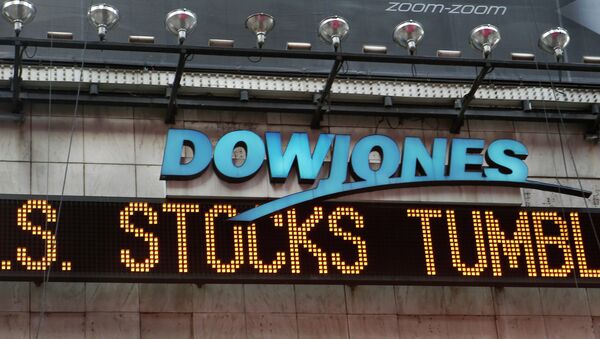Kristian Rouz – Wall Street posted its worst trading day since 2011 on Friday, with the Dow plunging 500 points (3% its value) and other major indices sliding as well. The recent lackluster industrial production data from mainland China, along with a massive decline in commodities, crude oil most prominently, has triggered selloffs in stocks worldwide, wiping some $3.3 trln off the value of stock markets across Asia, Europe and North America.
However, the world’s richest people have lost only some $182 bln for the outgoing week, with $76 bln of that sum lost on Friday alone.
The Dow Industrials settled at 10% below its record highest, posted in May. The Dow lost 530.94 points at Friday’s close to 16,495.75 points (-3.12%), with tech and energy sectors leading losses. Apple Inc. dropped 6.12% and Microsoft Corp shed 5.67%. Chevron Corp., the international oil giant, slumped 4.39% as crude dropped below $40/bbl. US financial also retreated, with JPMorgan Chase sliding 3.55% and Goldman Sachs retreating 4.58%.
The S&P thus posted its worst losses since October 2011 during Thursday’s and Friday’s trading. The index is currently 7.5% below its record highest, posted in May.
The decline in US shares was accompanied with a surge in volatility with the Chicago Board Options Exchange Volatility Index (VIX)hit its highest since October 2014, having posted its record highest one-week gain of 46.45%, standing at 28.03 on Friday compared to a reading of 12.83 on 14 August.
The losses in US shares followed a prolonged period of low volatility and flat movement in stocks amidst a moderate economic expansion in the US. However, the global headwinds to financial markets have reached the US, showing that America will not remain a peaceful island of stability in the global financial meltdown, stemming from China.
The MSCI’s emerging market index dropped to its lowest in 4 years, 2.16% down, while MSCI all countries index slumped 2.7%. The numbers for the US stock rout are quite similar to these, suggesting this drop is an adjustment to the changing environment rather than a full-blown crash.
Sharp selloffs in commodity assets has historically been clear signal of an imminent global recession, however, that is not necessarily the case these days. The decline in crude prices is a consequence of a technological breakthroughs and the advance of cleaner renewables, combined with weaker demand from nations that exhausted their potential of industrial growth. At this point, it hardly indicates a slump in economic activity in developed nations.
FX markets were also shaken, with US dollar futures losing 2.7% for the week in a sharpest drop since June 2013. Competitive devaluations in the world’s currencies are fueling a major deflationary wave in the US, which the US Fed hardly wants with their 2% inflation target. That said, it is less likely the US regulator will ever move to raise its base interest rate anytime soon given the global circumstances.
All in all, even after today’s movements, US stocks are at their 25-year averages in terms of price to earnings, meaning the threat of a stock bubble may be greatly exaggerated. Further losses in US stocks are possible, however, macro fundamentals support further flat movement on Wall Street until the Fed moves on monetary policy




